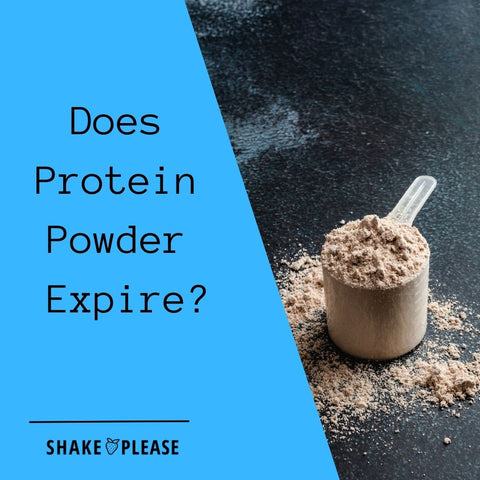Get the facts on what happens when protein powder expires and if it's still usable

Protein powder is a staple in many fitness enthusiasts' diets.
Whether you use it to build muscle, aid in recovery, or supplement your protein intake, it's important to understand how long protein powder lasts and if it can expire.
In this article, we will explore the topic of protein powder expiration dates, the factors that affect its shelf life, how to check if your protein powder has expired, and the importance of consuming fresh protein powder.
We will also discuss proper storage methods to extend its shelf life, common misconceptions about protein powder expiration, and whether it is safe to use expired protein powder.
So, let's dive in and unravel the mystery of protein powder expiration!
The Importance of Consuming Fresh Protein Powder
Consuming fresh protein powder is vital for maximizing its effectiveness and reaping its benefits.
Fresh protein powder ensures that you are getting the optimal amount of protein and essential amino acids needed for muscle growth, recovery, and overall health. When protein powder expires or degrades, its nutritional value may diminish, making it less effective in meeting your dietary and fitness goals.
Moreover, fresh protein powder tastes better and mixes more easily, providing a more enjoyable experience. The flavor and texture of expired protein powder may become unpleasant, making it difficult to incorporate into your daily routine.
By consuming fresh protein powder, you can have confidence in its quality and enjoy the full benefits it offers.
Storing Protein Powder Properly to Extend Its Shelf Life
Proper storage is crucial in extending the shelf life of protein powder. To keep your protein powder fresh for as long as possible, follow these guidelines:
- Store in a cool, dry place: Moisture is the enemy of protein powder. Keep it away from areas with high humidity, such as the bathroom or kitchen. Instead, choose a cool, dry pantry or cupboard for storage.
- Seal the container tightly: After each use, make sure to seal the protein powder container tightly. This will prevent moisture from entering and keep the powder fresh.
- Avoid exposure to heat and sunlight: Heat and sunlight can degrade the nutritional value of protein powder. Store it away from direct sunlight and sources of heat, such as stoves or radiators.
- Use airtight containers: If you purchase protein powder in bulk, consider transferring it to airtight containers or resealable bags. This will help maintain its freshness and prevent moisture from seeping in.
By following these storage tips, you can extend the shelf life of your protein powder and ensure that it remains fresh and effective for longer periods.
Understanding Protein Powder Expiration Dates
Protein powder, like any other food product, has an expiration date. The expiration date provides a guideline for its freshness and quality.
However, it's important to note that the expiration date on protein powder is not an indicator of its safety. Most protein powders have a shelf life of about 1-2 years from the date of manufacture. This means that the powder is expected to retain its nutritional value and taste within this time frame.
It's worth mentioning that the expiration date on protein powder is often a conservative estimate. Many protein powders can still be consumed safely and provide the desired benefits even after the expiration date has passed.
However, it's always recommended to check for signs of spoilage before consuming expired protein powder.
Factors That Affect Protein Powder Shelf Life
Several factors can affect the shelf life of protein powder. The primary factor is the quality of the ingredients used in its production.
High-quality protein powders that are made from pure ingredients and undergo rigorous testing tend to have a longer shelf life. On the other hand, protein powders that contain additives or low-quality ingredients may have a shorter shelf life.
Another factor that affects protein powder shelf life is exposure to moisture. Moisture can cause the powder to clump or develop mold, rendering it unsafe for consumption. It's essential to store protein powder in a cool, dry place to prevent moisture absorption.
Additionally, exposure to heat and sunlight can degrade the nutritional value of the powder and shorten its shelf life.
How to Check If Your Protein Powder Has Expired
To determine if your protein powder has expired, start by checking the expiration date printed on the packaging. If the date has passed, it's time to perform a visual and sensory inspection. Look for any signs of discoloration, clumping, or an off smell. If the powder appears discolored or has a foul odor, it's best to discard it.
Another way to check if your protein powder has expired is to mix a small amount with water or your preferred liquid and taste it. If the flavor is significantly off or unpleasant, it's a clear indication that the powder has gone bad. Trust your senses and never consume protein powder that seems questionable
ULTIMATE GUIDE TO WHEY PROTEIN FOR WOMEN
Common Misconceptions About Protein Powder Expiration
There are several common misconceptions surrounding protein powder expiration. One of the most prevalent misconceptions is that consuming expired protein powder can be harmful to your health.
While it's true that protein powder may lose some of its nutritional value over time, it is generally safe to consume if no signs of spoilage are present. However, it's always recommended to use your judgment and discard protein powder that appears discolored, clumpy, or has an off smell.
Another misconception is that protein powder expiration dates are set in stone. As mentioned earlier, the expiration date on protein powder is often a conservative estimate. Many protein powders can still be consumed safely and provide the desired benefits even after the expiration date has passed.
However, it's important to use your senses and check for signs of spoilage before consuming expired protein powder.
PROTEIN SHAKE INGREDIENTS: CRAFTING WELLNESS IN A BLENDER
Conclusion
In conclusion, protein powder does have an expiration date, but it does not necessarily mean that it becomes unsafe to consume.
Most protein powders have a shelf life of 1-2 years from the date of manufacture and can still be consumed safely after the expiration date has passed, as long as there are no signs of spoilage.
However, consuming fresh protein powder is essential to maximize its nutritional value and enjoy the full benefits it offers.
By storing protein powder properly in a cool, dry place and using your senses to check for signs of spoilage, you can ensure that your protein powder remains fresh and effective for longer periods.
Remember, when it comes to protein powder, freshness matters!





